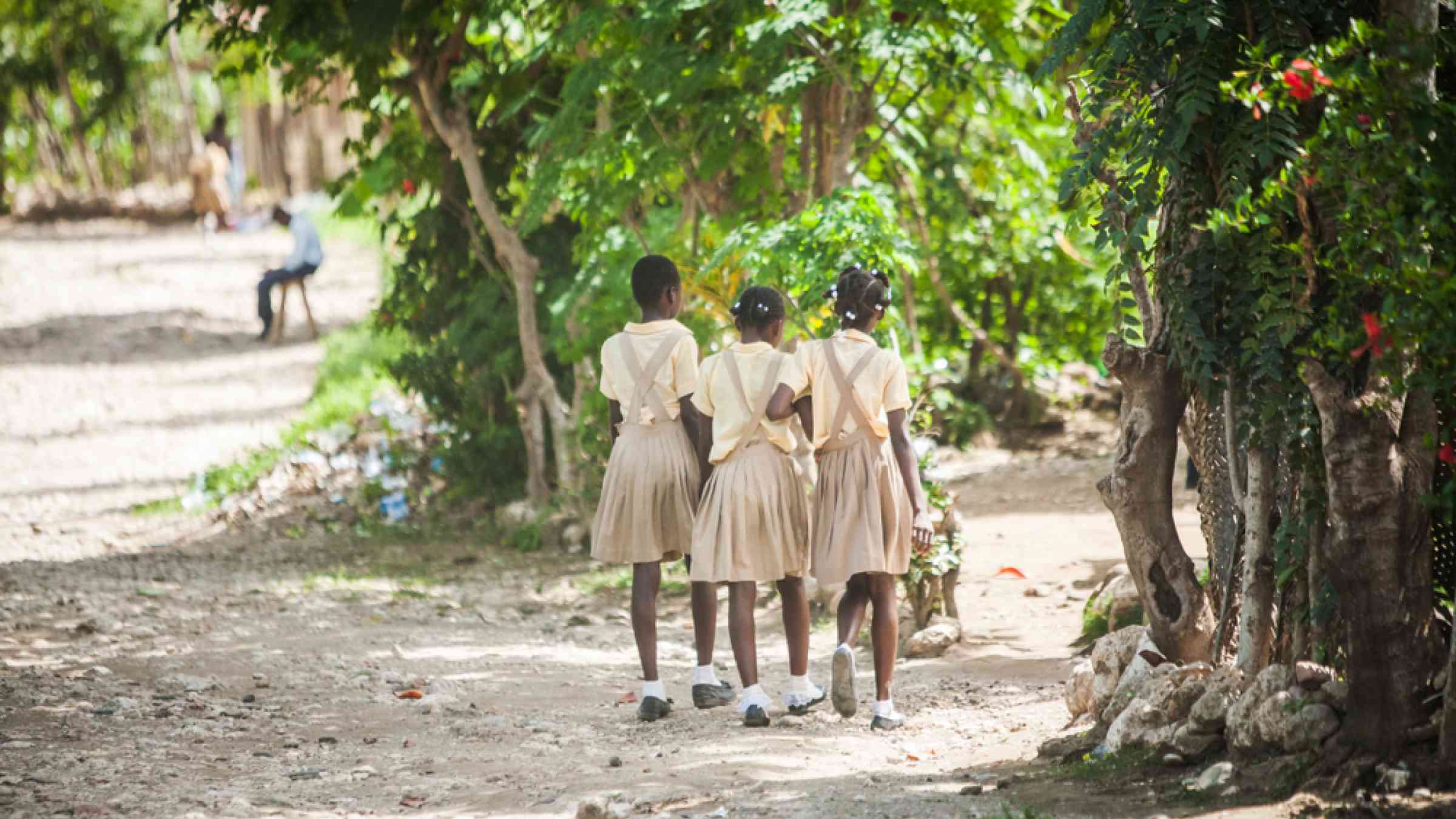Please help us improve PreventionWeb by taking this brief survey. Your input will allow us to better serve the needs of the DRR community.
UNDRR ROAMC: Making Caribbean children count in drive for safer schools

From devising educational TV shows to rolling out online classes and delivering worksheets to far-flung villages, the pandemic has proved a steep learning curve for Caribbean teachers as they find innovative ways to keep pupils on track.
The disruptive school closures sparked by the crisis have underscored the need for a stronger focus on educational continuity and school safety as the region faces ever-more complex risks, say education and disaster management specialists.
“The pandemic has really highlighted the need for safer schools,” says Curtis King, a former teacher who is now minister of education for St. Vincent and the Grenadines.
“COVID-19 has provided us with an opportunity to enhance our whole resilience in terms of ensuring that education continues, even in times of national disasters or a pandemic,” says King, chair of the Caribbean Safe School Initiative (CSSI).
Across the region, countries need to ramp up investments in both education and technology so they can build on lessons learned during the pandemic and apply them to crisis scenarios such as hurricanes down the track, say experts.
So far, 18 Caribbean countries including Cuba, the Turks and Caicos and Dominica have signed up to the CSSI which provides a “roadmap” outlining the steps countries need to take to make their schools safer.
Using the framework, many countries are gradually retrofitting outdated facilities, ensuring new buildings are resilient and training both teachers and pupils to better prepare for emergencies such as earthquakes and floods. School curricula are being adapted to include children as agent of change in their schools and communities.
“Education is the critical vehicle for change,” says Elizabeth Riley, acting executive director of the Caribbean Disaster and Emergency Management Agency (CDEMA), which is driving the regional initiative.
“For us, in building resilience, education must be a priority.”
DEEP DIVISIONS
Pre-pandemic, few Caribbean countries had comprehensive remote learning systems in place and had to quickly scramble to get them up and running. But educators say it takes more than providing online lessons to ensure equal access when face-to-face schooling is disrupted.
Bridging the deep digital divide has proved a major challenge for schools in the Caribbean, where some homes have patchy electricity, let alone WiFi, and parents may not be able to afford tablets or laptops for their children.
But since the crisis began, some countries have taken major strides to make sure children are connected.
The Dominican Republic has set up free WiFi hotspots while countries including Jamaica and St. Lucia have provided thousands of devices to schools. In St. Vincent, the government has given 17,000 devices to teachers and pupils while telecoms firms have helped provide cheap connectivity.
“COVID-19 pandemic has emphasized the need to enhance the overall investment in the education sector,” Issac Solomon, the Caribbean Development Bank’s vice president of operations, told the 2021 CSSI Pre-Ministerial Forum
“The economic returns to school safety investments are tremendously high.”
Speakers at the virtual event also stressed that children who qualify for free meals at school need to have access to sufficient food when they are learning from home.
The pandemic has also shown the need to protect vulnerable children in remote learning environments where teachers find it harder to identify those who require psycho-social support and drop-out rates often rise, they said.
“Learning losses contribute to widening gaps and inequality in the school system, the economic impacts down the track of children dropping out are enormous,” says Raul Salazar, chief of the United Nations Office for Disaster Risk Reduction, Regional Office for the Americas and the Caribbean (UNDRR).
“For schools to be safe, we need a better understanding of the multi-dimensional nature of risk,” he says.
To boost school safety in the Caribbean, education policies and plans need to be aligned with the Sendai Framework for Disaster Risk Reduction, the Sustainable Development Goals and the Paris Agreement on climate change, Salazar adds.
HYBRID FUTURE
In St. Lucia, Bernez Kohdra who works as the Ministry of Education’s school safety coordinator, now hopes the increased focus on education could result in much-needed funding for Caribbean schools to help them reach their safety targets.
“One of the challenges is definitely finances, but there were many opportunities that we seized that came as a result of COVID-19,” says Khodra.
“We have come a long way but we still have a long way to go.”
Thanks to a long-standing commitment to school safety, trainee teachers in St. Lucia now learn how to identify, manage and reduce risks. Facilities are being overhauled to strip out old wiring and add smoke detectors while buildings are being made accessible to pupils with disabilities, he says.
Setting up school safety teams and closely involving children in drills and disaster management is key. Now, if an earthquake alarm rings, pupils know to instantly drop to the ground, take cover and evacuate when the shaking stops, says Khodra.
As Caribbean countries start to recover from the pandemic, many are likely to keep a blend of classroom and distance learning in place to ensure children can continue learning during future emergencies, says King.
“One of the greatest benefits now is that we have learned and shared many lessons on school safety in the region and this is helping to move the school safety agenda forward,” he says.
Explore further
Also featured on
Please note: Content is displayed as last posted by a PreventionWeb community member or editor. The views expressed therein are not necessarily those of UNDRR, PreventionWeb, or its sponsors. See our terms of use
Is this page useful?
Yes No Report an issue on this pageThank you. If you have 2 minutes, we would benefit from additional feedback (link opens in a new window).